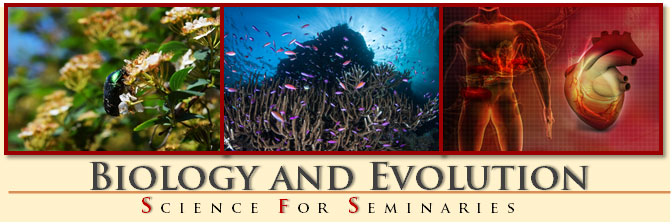
In addition to the inanimate creation, Scriptural texts make frequent mention of plants and animals. There is recurring imagery involving domesticated animals (e.g., God as shepherd in Psalm 23 and Jesus as the Good Shepherd), biblical texts marvel about humans (Psalm 139) and wild animals (Job 39). The resources below provide information about living things, the evolutionary process, and how biologists learn about them.
- The Society for the Study of Evolution publishes the journal Evolution which can be accessed through Catholic University’s library database. The education and outreach section of the site includes links to Resources for Students and Teachers and the new EvoED Digital Library of resources in cooperation with the Ecological Society of America (see their educator resources), the Society for Economic Botany (see their education and outreach), and the Botanical Society of America (see their outreach and resources pages). The Society for the Study of Evolution's brief Statement on Evolution includes links to similar statements by a dozen other professional societies.
- The American Society of Naturalists (ASN) has a statement on evolution that links to the article “Evolution, Science, and Society,” which is a document representing the consensus of eight major scientific societies, all of which are linked at the bottom of the webpage with the ASN’s statement.
- The Linnean Society has an education resources page. They have categories of resources for children, students, teachers, the history of science, art in science, a glossary and more.
- The National Academies hosts a page on evolution that includes sections on science and religion, evolution and society, and general resources on evolution.
- The Public Broadcasting Service hosts an online course for those teaching evolution that clarifies the theory and the obstacles to teaching evolution.
- The University of California Paleontology Museum (UCPM) hosts online exhibits on several topics including Understanding Evolution, which includes an introduction to evolution and teaching materials, a resource library, and links to evolution in the news.
- This introduction to evolutionary psychology from UCLA’s Cognitive Cultural Studies “CogWeb” consists of many sequentially linked pages beginning with evolutionary theory.
- The American Anthropology Association (AAA) has a range of resources for teachers and a website introducing the discipline of anthropology. The AAA also developed an interactive website Understanding Race, related to its wider award-winning RACE Project. See also the AAA statement on race.
- The Biological Anthropology site hosted by Scitable is an educational website devoted to informing visitors about the evolution of humans and human behavior. Scitable also hosts an educational site about genetics including several accessible free ebooks and an article library that opens into an extensive body of material about genetics.
- The University of Utah hosts The Genetic Science Learning Center, which has information about genetics, neuroscience, and other life sciences.
- The National Library of Medicine at NIH hosts GeneEd which collects many educational resources categorized by specific fields related to genetics.
- The Tech Museum of Innovation has a site called Understanding Genetics with basic information, a video gallery, news items contextualized by geneticists, and online interactive exhibits.
- The Human Genome Project has links to educational resources and further information about genetics and the project.
- The World Health Organization hosts an introduction to issues in Gender and Genetics. Also, NOBA hosts a learning module on gender including an instructor manual.
